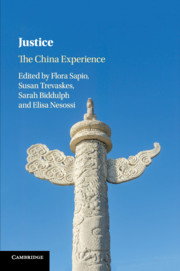Part I - Constructing the Idea of Justice
Traditional and Contemporary Perspectives
Published online by Cambridge University Press: 02 August 2017
- Type
- Chapter
- Information
- JusticeThe China Experience, pp. 1 - 110Publisher: Cambridge University PressPrint publication year: 2017

